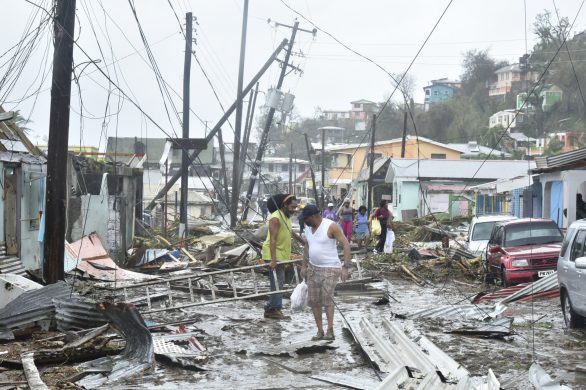ROSEAU, 21 September, 2018 (IOM): One year ago, Hurricane Maria reached the island of Dominica with a wind speed of 220 mph (354 kph). The results were devastating: 31 lives were lost and 34 are still missing; roads and bridges were devastated and about 90 per cent of the housing stock in the island was damaged or destroyed.
The day after the hurricane hit, 71-year-old Randel Adams found himself on the brink of tears. His roof was entirely gone. The contents of his house were soaked and soiled. He made himself a make-shift home and braced himself to bear rain and inclement weather. While Adams patched his roof the best he could, thousands of families poured out of the battered island and the government faced the nearly impossible task of restoring damaged property worth millions of dollars, the island’s economy, and people’s lives.
FN-indsats med penge fra bl.a. Kina, EU og Australien
A few days after the hurricane, an IOM team was on the ground distributing tarpaulins, solar lights, hygiene kits and other non-food items, and tracking the status of displaced people in emergency shelters around the island using the Displacement Tracking Matrix (DTM) tool.
Since then, IOM has been working tirelessly in communities across Dominica to assist the most vulnerable through Shelter Recovery programmes funded by UK Aid, the European Union’s humanitarian arm (ECHO), Australia Aid and China AID via the United Nations Development Programme (UNDP). The programme has repaired almost 700 roofs, allowing families to return to their homes and developing their capacity and resilience to disasters.
Adams qualified to receive humanitarian assistance from IOM because he met several vulnerability criteria; he now lives in a safe and secure space. “This roof is better and stronger. I am happy that the roof is well-fixed, and I am not getting wet. I am now much better prepared when a hurricane is coming,” he said.
Træner håndværkere
The programme is also building resilience by training carpenters and homeowners. To date, over 100 Dominican men and women have been trained in basic carpentry guided by the Dominica Building Standards. In collaboration with the Office of Disaster Management, 83 managers of emergency shelters were trained and certified in camp management practices.
“IOM is teaching residents about the importance of safe building practices and how to stay prepared for the hurricane season. We also engaged communities in the selection of beneficiaries. Through open, transparent and participative processes we are able to reach people who are most in need,” explained Jan-Willem Wegdam, IOM Dominica Team Leader. “As we rebuild, we work together to rebuild better homes, but also better communities and lives for Dominicans,” he continued.
5.000 familier mangler fortsat tag over hovedet
Despite the progress achieved, the needs on the island are still enormous. More resources would allow IOM and its partners to accelerate and expand the implementation of shelter recovery programmes. An estimated 5,000 families are still living under tarpaulins, damaged roofs or with friends and families.
“To get my roof back today or tomorrow would be the joy of my life. I would be so happy and comfortable. You know, after living in your proper home for all these years… to get into that devastating situation [is] not a good feeling,” says 64-year-old Camillia Burton, a small shopkeeper and farmer of the Marigot community. Burton currently lives in a small room with her four grandchildren due to structural damages inflicted to her home by Maria.
IOM’s Wegdam also highlighted a need to provide humanitarian services beyond rebuilding: “Maria hit more than only roofs, so we should ideally have a programme where we can spend our money on a much broader range of improvements, including livelihoods or psychosocial support. IOM will continue to work in collaboration with the government and key allies to implement an integrated approach to support communities.”




